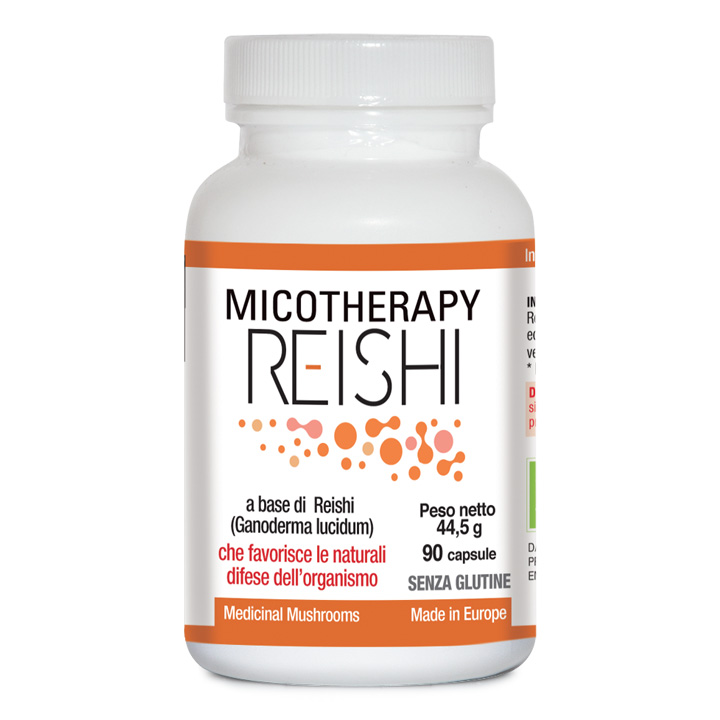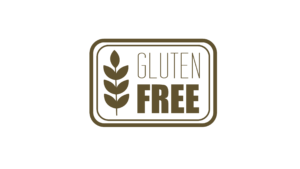
Ottimizza la gestione dello stress
Integratore alimentare a base di Reishi (Ganoderma lucidum) da coltivazione biologica (IT BIO 006) – Made in Europe

Proprietà:
Chiamato anche “Fungo dei mille anni” e “Fungo dell’immortalità”, il Reishi è considerato tradizionalmente un rimedio utile nel ripristinare l’equilibrio dell’organismo, contribuendo a migliorare la resistenza alle malattie
Finalità salutistiche:
Il Reishi è un fungo nel quale sono stati isolati numerosi composti bioattivi che ne spiegano in parte le funzioni; i più rilevanti sono: polisaccaridi, in particolare Beta-glucani, glicoproteine, triterperni, steroli, aminoacidi, nucleosidi, vitamine e minerali, tra cui il Germanio in elevata quantità. Grazie alle sue proprietà il Reishi aiuta a regolarizzare e a rinforzare il sistema immunitario. Inoltre svolge una naturale azione calmante, contribuendo a migliorare la capacità di gestire lo stress psicofisico.
Ingredienti:
- Reishi (Ganoderma lucidum) da agricoltura biologica, sporophorum ed estratto secco titolato in Polisaccaridi ed Ergotioneina
- Capsula in cellulosa vegetale
Modalità d’uso:
3 capsule al giorno preferibilmente lontano dai pasti
Formato:
confezioni da 30 e 90 capsule
NOTE:

no OGM
ingredienti da agricoltura biologica – Made in Europe
![]()
prodotto certificato Play Sure-Doping Free
inserito nel registro degli integratori: codice 62493
Codice Paraf.: 923589004
| Tenore medio ingredienti caratterizzanti | Per dose giornaliera (3 cps) |
| Reishi estratto secco | 960 mg |
| Apporto in polisaccaridi | 240 mg |
| Apporto ergotioneina | 227 mcg |
| Reishi sporophorum | 240 mg |
Bibliografia:
- Zhou, Sh.; Gao, Y. The immunomodulating effects of Ganoderma lucidum (Curt.: Fr.) P. Karst. (Ling Zhi, reishi mushroom) (Aphyllo- phoromycetideae). Int. J. Med. Mushrooms 2002, 4 (1), 1–11
- Liu, G.T. Recent advances in research of pharmacology and clinical applications of Ganoderma P. Karst. species (Aphyllophoromycetideae) in China. Int. J. Med. Mushrooms 1999, 1 (1), 63–68
- Ko, H-H., H. Chi-Feng, J-P. Wang & C-N. Lin, 2008. “Antiinflammatory triterpenoids and steroids from Ganoderma lucidum and G. tsugae.” Phytochemistry Volume 69, Issue 1, January, Pages 234-239
- TV Lasukova, AG Arbuzov, LN Maslov, and VN Burkova. Ganoderma lucidum extract in cardiac diastolic dysfunction and irreversible cardiomyocytic damage in ischemia and reperfusion of the isolated heart. Patol Fiziol Eksp Ter, Jan 2008; (1): 22-5
- Zhang HN, Lin ZB (2004). Hypoglycemic effects of Ganoderma lucidum polysacchrides.Acta Pharmacol. 25 (2):191-195
- Tang W, Gao Y, Chen G, et al. A Randomized, Double-Blind and Placebo-Controlled Study of a Ganoderma lucidum Polysaccharide Extract in Neurasthenia. J Med Food. 2005;8:53-58
- R Zhang, S Xu, Y Cai, M Zhou, X Zuo and P Chan. Ganoderma lucidum Protects Dopaminergic Neuron Degeneration Through Inhibition of Microglial Activation. eCAM Advance Access published July 16, 2009
- ZY Zhou, YP Tang, J Xiang, P Wua, HM Jin, Z Wang, M Mori, and DF Cai. Neuroprotective effects of water-soluble Ganoderma lucidum polysaccharides on cerebral ischemic injury in rats. J Ethnopharmacol, August 19, 2010; 131(1): 154-64
- B Lakshmi, TA Ajith, N Jose, and KK Janardhanan Antimutagenic activity of methanolic extract of Ganoderma lucidum and its effect on hepatic damage caused by benzo[a]pyrene. J Ethnopharmacol, September 19, 2006; 107(2): 297-303
- Y Shi, J Sun, H He, H Guo, and S Zhang. Hepatoprotective effects of Ganoderma lucidum peptides against D-galactosamine-induced liver injury in mice. J Ethnopharmacol, May 22, 2008; 117(3): 415-9
- YQ Li and SF Wang Anti-hepatitis B activities of ganoderic acid from Ganoderma lucidum. Biotechnol Lett, June 1, 2006; 28(11): 837-41
- Zhou, Sh.; Gao, Y.; Chen, G.; Dai, X.; Ye, J.;Gao, H. A phase I=II study of a Ganoderma lucidum (Curt.: Fr.) P. Karst. (Ling Zhi, Reishi mushroom) extract in patients with chronic hepatitis B. Int. J. Med. Mushrooms 2002, 4 (4), 321–328
- Gao, Y.; Lan, J.; Dai, X.; Ye, J.; Zhou, Sh. A phase I/II study of Ling Zhi mushroom Ganoderma lucidum. (W. Curt.: Fr.) Lloyd (Aphyllophoromycetideae) extract in patients with type II diabetes mellitus. Int. J. Med. Mushrooms 2004, 6 (1)
- Dott. Martin Powell. The Use of Ganoderma lucidum (Reishi) in the Management of Histamine-Mediated Allergic Responses. Nutrition Practitioner October 2004 (www.nutprac.com)
- Sone Y, Okuda R, Wada N, Kishida E, Misaki A. Structures and antitumor activities of the polysaccharides isolated from fruiting body and the growing culture of mycelium of Ganoderma lucidum. Agric Biol Chem 1985;49:2641–53
- Mao T, van De Water J, Keen CL, et al. Two mushrooms, Grifola frondosa and Ganoderma lucidum, can stimulate cytokine gene expression and proliferation in human T lymphocytes. Int J Immunother 1999;15(1):13-22
- Chan WK, Cheung CC, Law HK, et al. Ganoderma lucidum polysaccharides can induce human monocytic leukemia cells into dendritic cells with immuno-stimulatory function. J Hematol Oncol. 2008;1(1):9
- Gao Y, Zhou S, Jiang W, et al. Effects of ganopoly (a Ganoderma lucidum polysaccharide extract) on the immune functions in advanced-stage cancer patients. Immunol Invest. Aug 2003;32(3):201-215
- HY Hsu, KF Hua, WC Wu, J Hsu, ST Weng, TL Lin, CY Liu, RS Hseu, and CT Huang. Reishi immuno-modulation protein induces interleukin-2 expression via protein kinase-dependent signaling pathways within human T cells. J Cell Physiol, Apr 2008; 215(1): 15-26
- Stanley G, Harvey K, Slivova V, Jiang J, Sliva D. Ganoderma lucidum suppresses angiogenesis through the inhibition of secretion of VEGF and TGF-_1 from prostate cancer cells. Biochem Biophys Res Commun 2005;330:46–52
- Free radical scavenging and immunomodulatory activities of Ganoderma lucidum polysaccharides derivatives.J Wang, Y Wang, X Liu, Y Yuan, and T Yue . Carbohydr Polym, January 2, 2013; 91(1): 33-8
per ulteriori informazioni visitate www.micotherapy.it




